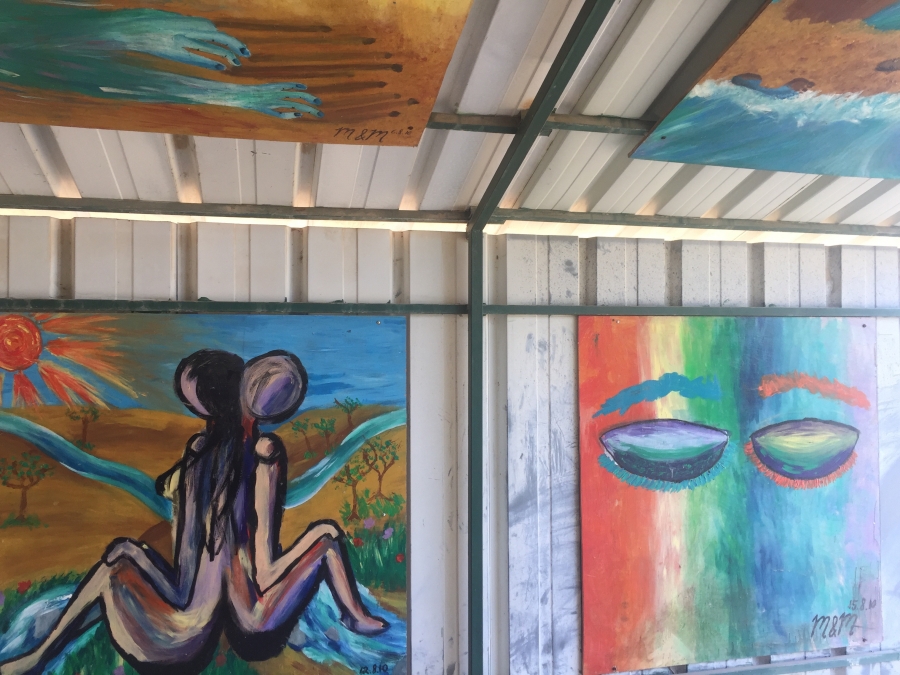What I didn’t expect was how much fun it would be. Each time I dipped, and came up to speak my words, I smiled and laughed.
I drove 60 miles north of my home in Rehovot, Israel, to go to the mikveh. I am not traditionally observant, and this would be the second time in my life using a mikveh (the first time was before I got married). Five years later, as a not-so-observant Jew, why was I going to a mikveh, let alone so far from home? After three years of being Editor of Ritualwell, I had finally caught the ritual-creating bug. I had read hundreds of powerful accounts of what the mikveh could mean to people at significant moments in their lives, and I felt I now had a moment I wanted to mark.
As I write in the introduction to “A Rebirth Mikveh Ritual for Mothers,” as a mother of two kids, an almost three-year-old and a one-year-old, I never had time to pause and process this transition to motherhood (it’s a wonder if anyone does!). I had come to a point where I wanted to stop and reconnect to myself, to consider who I am now as a person, having gone through the powerful and challenging transition to motherhood, and to acknowledge that I had changed in ways I’m still discovering. The intention for the ritual was to allow myself to let go into the water, to feel held and mothered, and to emerge into my own power as a mother and as a person in this new stage of life. The start of the Jewish new year felt like the perfect time for this.
Writing the ritual was the easy part. It came in a burst of inspiration, in which I wrote my birth stories and explored some of my experiences in the first few years of motherhood, adding lines I wanted to recite while dipping. Finding a mikveh where I would feel comfortable was more challenging. I didn’t get too many enthusiastic recommendations of local mikvehs that would support non-traditional rituals. Luckily, some colleagues at Reconstructing Judaism recommended I seek out Rabbi Haviva Ner-David. I was amazed to discover that she runs the only non-denominational mikveh in Israel, called Shmaya Mikveh, at Kibbutz Hannaton. Though it was about a two-hour trek from home, I knew it would be worth the journey.

After I wrote my ritual, I met with Rabbi Haviva online for a spiritual counseling session in which we discussed more deeply my intentions for the ritual. Then, a few weeks later, on the Sunday between Rosh Hashanah and Yom Kippur, I took the plunge, so to speak. On my long drive north, it felt like an omen when the song “And It Stoned Me,” by Van Morrison, came on the radio:
Oh, the water
Oh, the water
Oh, the water
Hope it don’t rain all day
And it stoned me
And it stoned me to my soul
Stoned me just like goin’ home
And it stoned me
I stopped at the beach to spend some time alone, to do yoga, meditate, and write. I then hopped in the car and drove to the kibbutz. When I arrived at the mikveh I was greeted by beautiful paintings by one of Rabbi Haviva’s daughters. The paintings are responses to midrashim on the biblical creation story.

I chatted with Rabbi Haviva, fine-tuning parts of the ritual, and then took my time preparing. She met me in the mikveh, led me in a very moving guided meditation based on the stories I had written in advance, and then left me alone to immerse.

I was surprised at how comfortable I felt in this vulnerable space. And yet, I felt ready. I had already done the work of contemplation to get to this point. I had already taken the leap to create this moment for myself. I had done the work of tuning into what I needed and making it happen. That in and of itself was enough for me to recognize my own strength. All I had to do now was show up and let go into the water.

I dipped ten times, reciting the lines I had written. As I had hoped would happen, I felt held by the water. What I didn’t expect was how much fun it would be. Each time I dipped, and came up to speak my words, I smiled and laughed. For the first time I could really feel the bodily experience of saying these words, with water dripping down my chin, in a way that couldn’t happen behind a computer screen or while scribbling in a notebook. I rolled a little in the water like a kid. I listened to my own voice and liked what I heard. I couldn’t believe how liberating and affirming this was. Just me and the water and the words I wanted to say. Oh, the water, the water, it stoned me to my soul…
Hila Ratzabi is the Editor of Ritualwell.org. She is also a writing coach, freelance editor, and poet. She currently lives in Rehovot, Israel, with her husband and two kids.





